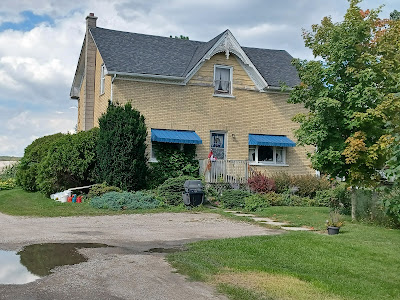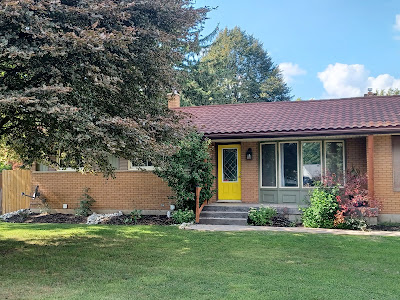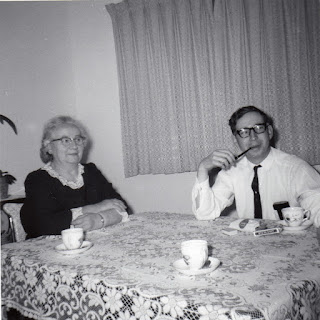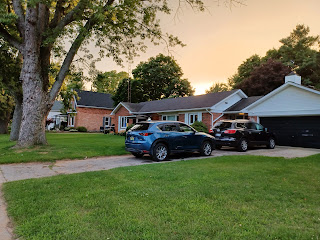Some time ago, one of the kids said to me, “Mom, we know quite a bit of your family’s story, but not so much of Dad’s side of the family.”
Well, since our travels have taken us to Woodstock, where much of the Schut family story plays out, and since the Resident Sweetie and I have been poking about the back roads of Oxford County, and since we’ve been hanging out with his brothers a lot and listening to their stories, I figured maybe this blog could begin to remedy that omission – a family story for our children, and a story about a family for the rest of you readers.
It starts with a woman, a strong and determined woman, who lost her husband to encephalitis when she was just about 40, two weeks before her youngest son, my RS, was born. Her husband – the father that Al never knew – owned a shoemaker’s shop in the town of Emmen in the Netherlands. They had been partners in the business, with mom behind the counter and "Pap" making and repairing shoes. Now she was alone
 | |||
| The shoe shop where Al was born. It has since become a cafe. |
 |
| Al visits his dad's grave and poses with his children and grandchildren in 2015. Such a special moment. |
And it starts with her four sons, aged 16 down to newborn at the time: Ralph, Hank, John, and baby Albert. Ralph at the age of 16 had to take on his father’s role and job. It was a year after the war had ended, and times were tough. There was a shortage of almost everything – supply chain issues, they’d call it now -- and nobody had money to spend. Mother Schut wondered what the future held for “mijn jongens” – my boys. She took in many boarders to make ends meet, and she was tough on her kids – Hank remembers peeling potatoes for all those boarders when he was just ten. But with the support of the extended family around them, they were making a go of it.
And then, in 1954, Ralph fell in love and wanted to get married. Not only that, but he wanted to immigrate with his bride Tina to Canada to seek a better future. My future mother-in-law could not fathom this. Her family had lived in the villages surrounding Emmen since the 1600s. However, if Ralph was going, they would all go. Who knew – perhaps there would be a better future for her boys. She knew nobody in Canada, she could not speak English, she was a 49 year old widow without any marketable skills, but – come hell or high water – the family would stay together. Her brother-in-law, who had been a surrogate dad for the boys, said he and his family would come too.
Ralph and Tina left for Canada right after they were married. Ralph dreamed of starting a business, but in the meantime worked in a brick-manufacturing plant to amass some capital. The shoe shop in Emmen was sold, and Mom Schut and her three boys, aged 18, 14, and 9 got ready to go. Two weeks before they were to leave, the brother-in-law backed out. Mom said, “We’re packed now, we’re going.”
On
April 15, they boarded a turbo prop airplane in Amsterdam. In the photo
they are smiling, but on the inside, there was much turmoil. Hank, at
18, was apprenticed to a gardener with the parks department. He loved
his job. What would await him in Canada? John, 14, was a scholar; his
teacher had begged Mom to leave him in Holland, where he was sure to get
into a university. What was there for him in Canada? Al was too young
to feel much of anything, but he didn’t like change, and this trip would
mean change.
The plane landed in Montreal, and from there they
boarded a train that took them to Brantford Ontario. They arrived at 3
o’clock in the morning. Ralph was waiting with a pick-up truck. And life
in Canada, with its many ups and downs and surprises, began.
Mom
climbed into the cab of the pick-up, the three boys climbed into the
back bed of the truck, the luggage got piled in, and they were off into
the frigid Ontario spring air, bouncing over 35 kilometers of dark
country roads to arrive at their destination, the village of Drumbo.
 |
| The farmhouse in Drumbo is still there. |
Within
a day or two, Hank and John were sent off to work for farmers, even
though they had been city boys all their lives. Hank went to work for a
tobacco farmer and came home every day with tobacco tar smeared over his
hands and arms. John remembers that year like this: “Imagine: one day I
was a 14-year old high school student, and a day or two later I was
crouching on a milking stool beside a cow. If I could have, I would have
crawled back to the Atlantic Ocean and I would have swum all the way
back to Holland.” Albert was sent off to school; it was a mile away, and
on the walk there every day, he passed some nasty geese that set his
heart to beating anxiously. His teacher gave him an Eaton’s catalogue so
he could learn the English words for common household items and
clothing. And mom tried to make an old farmhouse into a home. In Holland
there’d been indoor plumbing – but not here. In Holland, she knew the
names of the milkman and baker but here she hid behind the door and
pretended nobody was home when they came calling. In Holland, she’d
lived in an urban neighbourhood; now she was by herself all day out in
the country, unless she walked into the village and hung out with her
daughter-in-law and the new baby. John said, “Mom never told us, but I
think there were buckets of tears shed in that lonely farmhouse
everyday.”
Was it worth it? Some immigrant stories do not have
happy endings. Life is too hard, the high hopes that inspired the move
dashed to smithereens. The immigrants either return home with their
tails between their legs, or they become hard and bitter as they tough
it out. But many stories do have a happy outcome.
The first year was hard, but then the family moved into town. Mom Schut watched proudly as her boys fulfilled her hopes for a better life. Ralph began his own side-line business of shoe repair, which became a full time job, with shoe sales as an extra.. Soon he was operating a men’s clothing store in small town Ontario. Hank began working for a bricklayer, which really suited his skills for precision. John says, “After a year of farming, I was apprenticed to a carpenter. This suited me so much better. I learned the skills, and then began working for a house builder. By the time I was 22, my boss was taking off for Florida for three months and leaving me in charge. A little light went on in my bean: why should I be doing his work, when I could have my own company and get the profit.?” Hank joined him in this, and H&J Schut Construction was born, a company that built about 350 homes and owned numerous apartment buildings.
 |
| Two of their own homes that Hank and John built: their own, when they had young families. |
And my RS completed high school and university, and became a computer professional.
 |
| Al and his mom when he was a university student. |
They all got married.
14 grandchildren graced Mom’s life, with lots of great-grands to follow.
And we all grew older.
“Her boys” and their
children were her life, and she kept a tight hold on them. She was still
tough on her boys, expected much from them, until the day she died in
June 1999 at the age of 93. On the night that she died a white dove sat
out in the courtyard of her nursing home, an angel come to guide her
home.
Of course, the story is not over. The oldest, Ralph and his
wife, have died.
Hank’s wife died unexpectedly two years ago. The two older brothers have memory issues now, so all the time spent with them this week, every country drive we take with them, every outing we take them on, every story told, is a precious jewel to add to our memories. One week ago today, despite a bad medical report about Hank's latest blood tests, we had a wonderful road trip to the Farmer’s Market in St. Jacob’s – I shared that experience on FB.
One never knows how much time is left on our life clock, and so it was important that we make this trip sooner rather than later. When we started out, we knew that unexpected things could happen. All our well-laid plans might not work out. And that is what did happen. As I write this, Hank is on life-support in the Woodstock General Hospital as a result of a bad reaction to a blood transfusion, followed by a heart attack. After all the grandkids have had a chance to say goodbye today, the life-support will be removed.
We have put a hold on our travel plans for now, doing
what is important for us and for the rest of the family.
Mom
Schut, you were a gutsy lady; because of your move, I’ve become part of
the Schut family story, and my children and grandchildren, too. Thanks
for raising my RS to be such a special guy. Brothers, you’ve been rocks
for your own families, and for us too. It’s an honour to share this
story today.



















.jpg)
.jpg)
.jpg)




